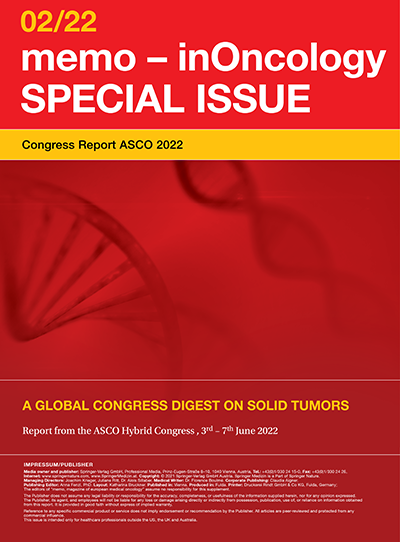ASCO Solid Tumors – 2022 virtual
Lecture Board: Ian Chau, MD; Chiara Cremolini, MD; Keun-Wook Lee, MD, PhD; Yunpeng Yang, MD; Li Zhang, MD
Medical Writer: Dr. Florence Boulmé
Publishing Editor: Anna Fenzl, PhD; Dr. Alois Sillaber
Preface ASCO 2021
As in 2020, the 2021 Annual Meeting of the American Society of Clinical Oncology (ASCO) was held online, with both the scientific and education programs taking place on June 4-8. Among more than 2,500 abstracts presented, findings in the area of lung cancer made for exiting news. Immune checkpoint inhibition has been moving forward in the continuum of care across the treatment lines and is now defining new standards in early-stage lung cancer.
Early-stage lung cancer: immunotherapeutic standards
Despite established strategies such as platinum-based chemotherapy and EGFR-targeted agents, there is a high unmet need for improved adjuvant treatment in the setting of completely resected early-stage NSCLC (stage IB-IIIA). Therefore, the global phase III IMpower010 trial tested the anti-PD-L1 antibody atezolizumab 1,200 mg every 21 days for 16 cycles compared to best supportive care (BSC) in patients with stage IB-IIIA lung cancer who had undergone lobectomy or pneumonectomy followed by 1-4 cycles of chemotherapy.
EGFR-mutant disease: strategies against sensitizing and resistance-mediating mutations
EGFR tyrosine kinase inhibitors (TKIs) are the established first-line option in patients with EGFR-mutated NSCLC, although resistance inevitably develops in the long run. A wide variety of genomic alterations has been identified in the context of EGFR TKI resistance. HER3, which is expressed in 83 % of NSCLC tumors, is not known to confer resistance to EGFR TKI therapy in EGFR-mutant disease.
KRAS, MET, ROS1, HER2: current perspectives
Approximately 13 % of patients with adenocarcinoma of the lung harbor the KRASG12C mutation. To date, no agent targeting this oncogenic driver has been licensed, although there is a need to improve outcomes in this population after progression on first-line treatment encompassing immune checkpoint inhibitors. The first-in-class, irreversible, selective KRASG12C inhibitor sotorasib has demonstrated durable clinical benefit in pretreated patients with KRASG12C-mutated, locally advanced or metastatic NSCLC in the single-arm phase II CodeBreaK100 trial.
Immunotherapy: from predictive factors to antibiotics
Based on the randomized, phase III CheckMate 9LA study, the first-line regimen of nivolumab plus ipilimumab and two cycles of chemotherapy has been approved in the indication of metastatic NSCLC without EGFR or ALK aberrations in many countries. CheckMate 9LA included approximately 360 patients with stage IV or recurrent disease in each arm and demonstrated significant OS, PFS, and ORR improvements with the immunotherapy-based regimen compared to four cycles of standard chemotherapy.
How does checkpoint inhibition perform in the setting of oncogene-driven lung cancer?
Retrospective analyses have demonstrated limited activity of immune checkpoint inhibitors (CPIs) in patients with actionable oncogenic driver mutations. In similar vein, the randomized controlled IMpower150 and IMpower130 studies revealed no survival benefit of adding CPIs to platinum doublets in patients who harbored EGFR and ALK aberrations.
Enhancing immunosupportive mechanisms via anti-angiogenesis
Treatment with anti-angiogenic agents offers potential in the management of patients progressing on immune checkpoint inhibitors as it has been shown that excessive VEGF production can create an immunosuppressive tumor microenvironment by modulation of immune cell function and reduction of immune cell access [1-3]. This might contribute to checkpoint inhibitor resistance and prime the tumor for anti-angiogenic therapy.
Opening up new vistas for patients with SCLC
Concurrent chemo-radiation with a platinum-etoposide backbone constitutes the standard of care in limited-stage small-cell lung cancer (LS-SCLC). Here, cisplatin is traditionally the preferred platinum agent. However, data on the comparative efficacy of the less toxic carboplatin in this setting are lacking. To fill this gap, Azar et al. conducted a retrospective study based on the National VA Cancer Cube database.
Resistance is all too often looming with targeted therapies
Resistance is the biggest challenge across the landscape of different compounds such as the new RET or MET inhibitors. I think it is promising to look at the story of EGFR-activating mutations, as initially we had gefitinib and erlotinib but were unaware of how they actually worked until the mutation data evolved. Subsequently, more potent compounds were created that continue to extend the time of patients on these treatments through improved medicinal chemistry and superior target binding.
EXPERT VIDEOS
All video interviews from ASCO Solid Tumors 2022
Kohei Shitara talks about new promising agents in the treatment of advanced HER2-positive gastric/gastroesophageal junction adenocarcinoma and how existing drugs can blend into these new regimens. He overviews the current state of prognostic and predictive biomarkers in gastric cancer and gives an outlook on new biomarkers that are on the rise to guide therapy while finally summarizing his personal medical and scientific highlights at this year’s ASCO meeting.
Anna Spreafico depicts her personal highlights regarding immunotherapy plus chemotherapy or intensity-modulated radiotherapy for people with locally advanced nasopharyngeal cancer (NPC) at this year’s ASCO meeting, discusses if longitudinal plasma EBV DNA monitoring should be incorporated into the guidance of personalized disease management and future clinical trials, highlights the most promising agents explored in the 1L treatment of recurrent/metastatic NPC and overviews how the prognosis of those patients will evolve in the years to come.

